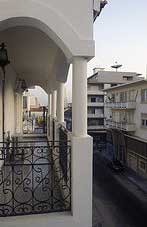Landlord has full control over rents
Senegal rental market practice is PRO-LANDLORD.
Rents: Can landlord and tenant freely agree rents in Senegal?
In theory rents on residential leases are fixed by law, according to the market value of the premises. However in practice, such rents are decided solely by the landlord.
 Rents can only be revised every three years. In the event that a revision of the rent cannot be mutually agreed between landlord and tenant, it has to be fixed by the relevant Court, after the case has been referred to it by one of the parties. Otherwise, any increase will be considered illicit.
Rents can only be revised every three years. In the event that a revision of the rent cannot be mutually agreed between landlord and tenant, it has to be fixed by the relevant Court, after the case has been referred to it by one of the parties. Otherwise, any increase will be considered illicit.
Deposits
The tenancy agreement may stipulate a deposit to guarantee payment of the rent and fulfillment by the tenant of his obligations stipulated in the contract, such as the promise to make the premises as good as at the beginning of the contract, and to pay all electricity, telephone and water bills.
At the expiry of the tenancy agreement, the deposit shall be repaid by the landlord, unless his tenant still owes him money or has not fulfilled the above obligations.
What rights do landlords and tenants have in Senegal, especially as to duration of contract, and eviction?
By law, residential leases are either fixed for three years duration, renewable for the same period of time, or they are indefinite period contracts. In the case of definite-term leases, the parties must comply with the duration, or else the contract shall deemed to be for an indefinite period. The contract ends on the day of expiry, if not renewed for a fresh three year period, or alternatively ends when termination is mutually agreed by the parties.
If the contract was stipulated for an indefinite duration, or is considered by law to be an indefinite period contract, it shall end by a two months "notice to quit" given by the tenant through a bailiff, or by a six months notice to quite given by the landlord.
The landlord shall be entitled to give notice to quit only for occupation by himself or spouse or his ancestor or descendant, or to demolish and rebuild the premises.
The tenancy contract may also be terminated by a mutual consent of the parties, or at thirty days' notice, for lack of compliance with the provisions of the contract.
How effective is the Senegalese legal system?
Despite the length of the proceedings, in general the legal system works.
 If the tenant refuses to leave at expiry of the contract, or at the expiry of six months prior notice to leave have been given by the landlord, or at the expiry of thirty days prior notice given to comply with the terms and conditions of the contract, the case may be referred to the Court..
If the tenant refuses to leave at expiry of the contract, or at the expiry of six months prior notice to leave have been given by the landlord, or at the expiry of thirty days prior notice given to comply with the terms and conditions of the contract, the case may be referred to the Court..
The Court may render its judgment within between one to three months. When there is a judgment for eviction, the tenant may ask to the Court for an extension. The Court may accept or reject that demand, but should not give the tenant more than twelve months extension. In practice, it is not usual for the Court to grant more than five months' extension.
It usually takes two to nine months to obtain a judgment for the collection of unpaid rent.
Effectiveness of law
EVICTION FOR NON-PAYMENT OF RENT |
||
| Duration until completion of service of process | 5 | |
| Duration of trial | 60 | |
| Duration of enforcement | 90 | |
| Total Days to Evict Tenant | 155 | |
| Courts: The Lex Mundi Project | ||
Legislation
Residential leases are ruled by the Law n°84-12 dated January 1984 as regards rent, the duration and termination of the contract, sublease and assigment of the contract and the obligations of the parties. This is part of the Civil and Commercial Obligation Code (Code des Obligations Civiles et Commerciales). Commercial leases are ruled by Uniform Act on Trade Law (Act Uniform portant sur le droit Commercial Général) dated April 17, 1997. This law is common to many African countries.
 Brief History: Recent changes in Senegalese landlord and tenant law
Brief History: Recent changes in Senegalese landlord and tenant law
As a result of public concern about 'speculation' in property due to the perceived harmful effects of the shortage of property, the Government decided to regulate the sector with Law n°84-12 of January 1984 was voted, which aims to protect tenancy, and which originally covered both residential and commercial leases. However since the harmonized of business law by several countries, the Uniform Act on Trade Law was adopted, and now regulates matters related to commercial leases.